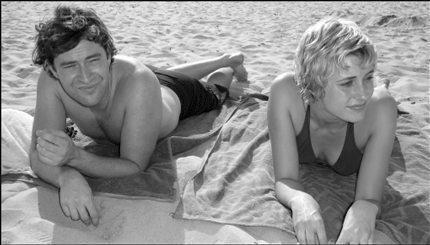By Leonard Quart
I first looked at a “mumblecore” film when I saw Andre Bujalski’s psychologically subtle, dialogue-bound, stylistically raw, Cassavetes-on-tranquilizers film, “Mutual Appreciation” (2005).
“Mumblecore” refers to a group of indie American filmmakers who tend to work on each other’s movies, and whose intimate, small films are performance-based and focus on the everyday problems, often about relationships, of middle-class twentysomethings who spend their days mainly talking. The films are made on tiny budgets, and are completed in accord with a collaborative, Do It Yourself ethic. Few of the films have had theatrical exposure.
Two mumblecore films — Joe Swanberg’s “Hannah Takes the Stairs” (his third feature) and Aaron Katz’s “Quiet City“ — are having their premiere engagements at the IFC this week. Neither of them is able to achieve “Mutual Appreciation’s” delicate feeling for behavior and character. But both are utterly natural and free of artifice — displaying a gift for evoking the way young, educated men and women relate to each other.
In “Hannah,” Swanberg uses a number of the movement’s filmmakers in prominent roles, including Andrew Bujalski (Paul). There is no traditional script — the writer’s credit is attributed to seven people — and the minimal narrative is utterly dependent on its actors’ gift for improvisation. The most talented is Greta Gerwig, who fortunately is at the film’s center as Hannah. She plays a chronically dissatisfied, recent college graduate, who falls in and out of love with a number of men during one Chicago summer.
Hannah interns for a production company, where she rarely seems to do any work. Her time is spent charming her sweet, awkward male co-workers with her humor and cleverness. Hannah can be indecisive, insecure, and callow, but she is also mercurial and unconventionally seductive. So, after she discards her “cool,” unemployed musician boyfriend, Mike (Mark Duplass), the two co-workers — Paul, an intellectual workaholic and Matt (Kent Osborne), a more playful but depressed writer — fall in love with her.
The film avoids providing explanations for Hannah’s capricious actions. It’s all long takes, close-ups, talk, and behavior — Hannah shedding tears about leaving emotional havoc in the wake of her abruptly terminated relationships, and trying to be sensitive to the men she hurts. Nothing is neatly shaped, nor does the film provide closure — the talk just flows on. Sometimes it’s tedious, other times poignant. Hannah is not without self-awareness, but her emotional neediness takes precedence. She is a flawed and luminous character.
Aaron Katz’s “Quiet City” is a less compelling work, though his film has a much more striking visual sense (Park Slope’s night streets and a crimson Brooklyn skyline at dusk) than Swanberg’s. Little happens, except two unsettled and not fully formed, emotionally low key people in their 20s meet accidentally, and spend twenty-four hours sitting in a park, talking to friends, attending an art opening, and returning to his apartment on a late night subway. Their talk is meandering and uneasy, and not very articulate or illuminating. There are too many silences, devoid of significance. But again, there is something truthful about this utterly ordinary story about two people beginning to connect emotionally.
And that, ultimately, resonates more than mainstream Hollywood fare. A few weeks ago I saw the breathlessly paced, meticulously controlled multiplex hit, “The Bourne Ultimatum” directed by the virtuosic Paul Greengrass (e.g., “Bloody Sunday”). But it’s the casual direction and mundane humanity of the “mumblecore” films, not “Bourne’s” brilliant editing and stunning locations, that stayed with me.



































